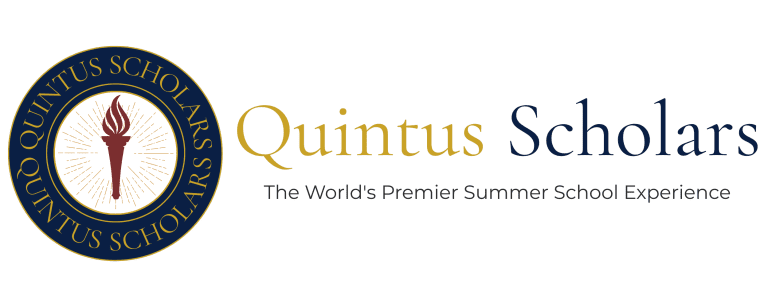Essay Competition

Introduction to the Quintus Scholars Essay Competition
Welcome to the Quintus Scholars Essay Competition, a prestigious global contest designed to challenge ambitious students and celebrate academic excellence. This competition provides a platform for young scholars to demonstrate originality, critical thinking, and evidence-based reasoning across a diverse range of subjects.
Each essay title invites you to explore a thought-provoking question, encouraging deep analysis, creativity, and rigorous argumentation. Whether your focus is on science, philosophy, literature, politics, or the arts, your essay should reflect independent thinking and a clear understanding of your chosen topic.
By participating, you will not only have the opportunity to compete for scholarships and recognition but also to develop essential academic skills, gain exposure to expert feedback, and connect with a community of like-minded peers. Each title is carefully crafted to inspire curiosity, spark debate, and challenge conventional perspectives, giving you the freedom to explore your ideas while adhering to the highest standards of scholarship.
Approach each essay with intellectual rigor, supported by credible evidence, structured reasoning, and original insight. Your response should not only answer the question but also demonstrate your ability to think critically, communicate persuasively, and engage with complex concepts: hallmarks of a Quintus Scholars essay.
General Options
Set 1
- What does it mean to be successful, and how should society measure it?
- How can young people make a real difference in tackling global challenges like climate change or inequality?
- Should technology be allowed to make decisions that affect humans, or should people always remain in control?
Set 2
- To what extent does social media shape identity and influence personal choices?
- How should governments balance freedom of speech with the need to protect society from harmful ideas?
- Is progress always beneficial, or can some advances in science, technology, or society do more harm than good?
Set 3
- If you could redesign society from scratch, what principles would guide it, and how would you implement them ethically?
- Can artificial intelligence ever make moral or ethical decisions better than humans? Argue with evidence and examples.
- Are humans inherently driven by self-interest or by empathy, and how does this shape the world we live in?
Subject specific
Cutting-edge Medicine: Surgery & Beyond
- Option A: Should robotic surgery replace traditional surgery in schools of medicine?
- Option B: How should emerging gene-editing technologies like CRISPR be ethically integrated into human healthcare?
- Option C: Evaluate the feasibility and ethical implications of fully autonomous AI surgeons performing complex operations without human oversight.
Visionary Builders: Architecture & Design
- Option A: How can school buildings be designed to improve student wellbeing and learning?
- Option B: To what extent should urban planners prioritise sustainability over aesthetics in modern cities?
- Option C: Propose a design for a self-sufficient floating city, balancing environmental impact, energy systems, and human habitation.
Financial Trailblazers: Banking & Finance
- Option A: Should schools teach children about personal finance and budgeting?
- Option B: How can blockchain technology transform traditional banking systems?
- Option C: Critically assess whether decentralized finance (DeFi) could replace global financial institutions without destabilizing the economy.
Master English: Learn English
- Option A: How does reading fiction improve empathy and communication skills?
- Option B: Analyze how language shapes social identity in modern media.
- Option C: Explore whether English will remain a global lingua franca in the 22nd century, considering technology, AI translation, and cultural shifts.
Beyond Gravity: Aerospace Engineering
- Option A: Should humans colonize Mars within the next 50 years?
- Option B: Evaluate the ethical and environmental consequences of launching private space missions.
- Option C: Could space elevators or orbital habitats realistically transform space travel within the next century? Support with engineering and scientific reasoning.
Hollywood & Broadway: Film, Drama & Acting
- Option A: How can theatre and drama classes improve emotional intelligence in teenagers?
- Option B: To what extent do film and television influence public perception of historical events?
- Option C: Critique whether AI-generated performances could ever achieve the emotional depth of human actors in dramatic arts.
Mind Matters: Psychology & Human Behaviour
- Option A: Why is learning to manage emotions important for teenagers?
- Option B: How does social media affect adolescent mental health, and what interventions could mitigate harm?
- Option C: Debate whether consciousness can ever be fully understood or replicated through neuroscience and AI.
The Influence Empire: Marketing
- Option A: How does advertising influence your choices every day?
- Option B: Analyze the ethical responsibilities of marketers in the era of social media influencers.
- Option C: Could AI-driven predictive marketing pose risks to free will and societal autonomy? Evaluate using evidence and examples.
Elite Thinkers: Philosophy, Politics & Law
- Option A: Should everyone have a say in creating the rules at school?
- Option B: To what extent should governments balance national security and individual privacy?
- Option C: Critically assess whether AI or machines could ever make fairer legal decisions than human judges.
Media Powerhouse: Journalism, Debate & Digital Influence
- Option A: Why is it important to check information before sharing it online?
- Option B: How should journalists adapt to combat fake news while preserving freedom of speech?
- Option C: Evaluate the impact of algorithm-driven news feeds on democracy and global public opinion.
Innovators and Coders: Engineering, AI & Programming
- Option A: How can coding skills help solve real-world problems?
- Option B: Should AI be allowed to make decisions in life-or-death situations?
- Option C: Explore whether fully autonomous AI systems could safely replace human decision-making in critical infrastructure.
Master Storytelling: Creative Writing & Global Culture
- Option A: How can storytelling help us understand different cultures?
- Option B: Discuss the role of narrative in shaping collective memory and identity.
- Option C: Craft a story concept that explores humanity’s relationship with AI and technology, challenging moral and philosophical assumptions.
Future CEO: Business & Entrepreneurship
- Option A: Why is teamwork important when starting a small project or business?
- Option B: Analyze the role of ethical leadership in global companies today.
- Option C: Debate whether profit-maximisation or social responsibility should define the success of multinational corporations in the next 50 years
